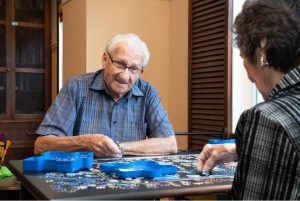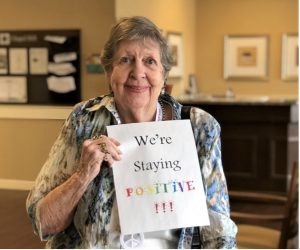
As we grow older, it is normal to have moments of forgetfulness. Who amongst us hasn’t misplaced things or forgotten the name of an acquaintance?
Then there are those instances where you find yourself in another room but can’t remember what you came to look for. You worry: are these normal memory lapses or early signs of Alzheimer’s Disease or another form of dementia?
When other’s begin to comment on your forgetfulness, and it becomes so persistent and severe that it affects everyday function, this is a signal that there may be a problem.
Lowering Your Risk of Dementia
Dementia and Alzheimer’s Disease are complex conditions with multiple risk factors. Some, like your age, genetics, and family history are outside of your control. Others are much more accessible. Research demonstrates that promoting brain health through lifestyle choices is the most effective way of reducing your chance of developing dementia or slowing down disease progression.
Risk reduction strategies for dementia focuses on being brain healthy and increasing quality of life:
- Regular exercise
- Mental stimulation and complex mental activity
- Social engagement
- Stress management
- Creating a routine
- Healthy diet
- Quality sleep
- Checking for and addressing common aging health problems
(e.g. falls, pain, memory problems, depression, isolation, incontinence, polypharmacy, etc.)
As it turns out, moving into a retirement residence early may add another layer to your protective factors. Let us explain.
The Health Benefits of Community
Healthy ageing is about creating the conditions and opportunities that enable people to engage with that which they value, throughout their lifetime. A number of factors can contribute to an older adult’s quality of ageing – and life, many of which relate to their surrounding environment.
Age friendly communities mean seniors are freed from chores, less reliant on family for assistance, and have more time and energy to enjoy friends and hobbies. They help residents feel happy and secure, while maintaining independence for longer.
Here are some of the ways that retirement communities can help you or your loved ones be brain healthy:
1. Regular Exercise
Being physically active is associated with a 38% reduced risk of developing Alzheimer’s disease! It has also been shown that physical activity – especially walking – can help slow the progression of memory loss.
Senior homes with organized fitness classes and gym facilities simply help older adults stay active for longer. There is nothing more motivating than having a village of peers and friends encouraging you to get active!
2. Mental stimulation
Mental exercise can also help elderly people build cognitive ability. With common-areas stocked with a variety of board games, weekly activity packages, and endless opportunity to join in national events, residents in senior communities engage their minds daily.
Group activities can also motivate people to form social connections, another factor that helps memory.
3. Social Engagement
One Australian survey found that 42% of people with dementia noticed that others avoided spending time with them because of their diagnosis; and 41% of people with dementia wished they had more social contact with others in the community.
Being in an age friendly community means that stigma and social isolation is drastically reduced. Seniors in assisted living make connections with other residents. These friendships in turn help prevent isolation, as well as increase a person’s likelihood of participating in enriching activities like fitness classes, happy hours, game nights, and more.
If your senior loved one often seems bored at home, find out how community living can motivate them to engage in a high quality of life with meaning, purpose, and value.
4. Stress Reduction
A study by Alzheimer’s Society investigators in the UK indicates that, while prolonged stress may play a role in development or progression of dementia, having chronic stress does not necessarily cause dementia.
For those already living with any form of dementia, controlling stress is essential to slowing the progression of the disease. This is because physical and emotional stress can lead to delirium, which can worsen decline.
5. Create a Routine
When days are unstructured and unpredictable, it can create boredom, which can contribute to cognitive decline.
Following a daily routine can reduce stress, increase the feeling of security, and improve sleep. By knowing what to expect, there’s no need to think or worry about what will happen next. Even though someone with dementia might not be consciously aware of the routine or even of the passing of time, going through a regular routine will make them feel more grounded and secure.
Many older adults have trouble sleeping through the night, and changes in sleep patterns are common in people with Alzheimer’s disease or other dementias. Studies show that creating a regular daily routine is a simple, medication free way to improve sleep.
Retirement Communities Help Seniors Maintain Autonomy
Today people are being diagnosed with dementia earlier and they want to be involved in decisions that will affect their lives.
It is not uncommon for seniors and their loved ones to wait until after a life-changing event prompts a move to a senior living community. When it takes place during a time of urgency, the transition can be unnerving. Transitioning early means your loved ones can choose the items that they take with them, those that hold importance or significance. This will help make them feel more at home.
Moving while decision making is still intact also means that you don’t have to go through the trauma of moving a person with more advanced dementia.
All Seniors Care offers a variety of brain healthy programs for residents at our Independent Retirement Living, Assisted Living, and Memory Care Communities. Explore our senior housing options in five provinces, including a unique memory care residence in Kanata. We also have new, vibrant senior communities in Whitby and Hamilton that provide the full continuum of care.
Everyone wants to have personal choice, as well as control or influence over decisions about their future home. Moving into a retirement village early allows an older person to establish roots in a community of their choosing and create a familiar routine in a safe and secure space. Contact us today.

